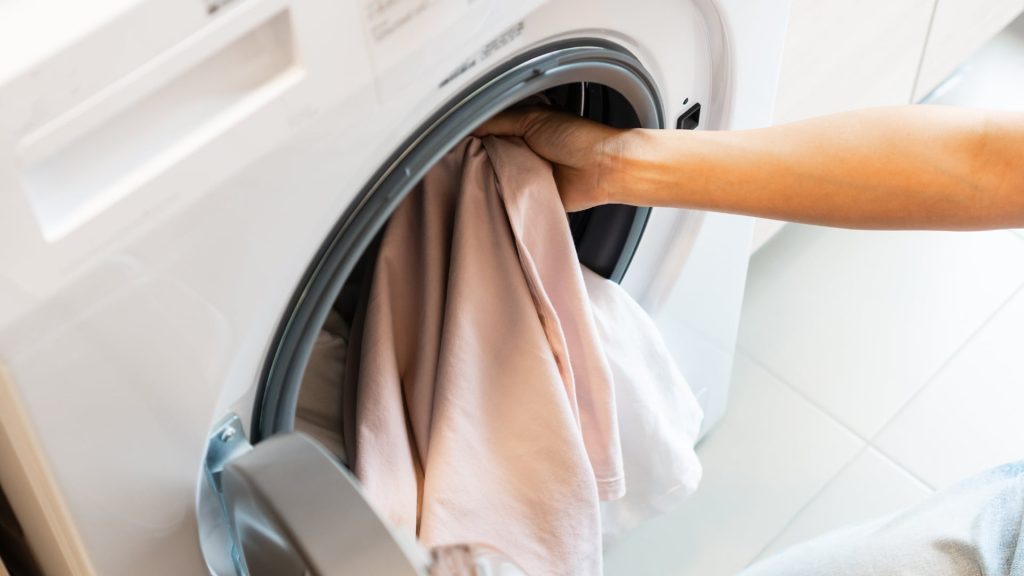It’s not a new fact that washing machines are one of those home appliances that face the most issues with damage and breakage. You must be careful how you use the washing programs, especially the hot washing cycle.
I tried to explain all the possible issues you might face if you use hot cycles frequently and what you need to know to prolong your washer’s lifespan.
So, does hot water damage washing machine?
Let’s end this mystery once and for all!

Does Hot Water Damage Washing Machine?
The truth is hot water can damage your washer, but it largely depends on other factors. The biggest damage the hot washing cycles can do is develop a bad odor inside the drum and cause mold and bacteria buildup.
Another common problem that many people face is the rubber seal at the door opening not working properly, leading to water leakage.
I will explain how these problems actually happen in the next section.
Negative Sides of Using Hot Water During the Washing Cycle
Smelly washer drum
Did you know that your washing machine can develop a bad odor? This odor comes from your washer’s drum after the end of the heavy-duty program.
If you tend to use hot cycles too often, especially when washing dirty clothes with soil and grease, the hot water releases the smell from the fabric and spreads it around the drum.
This is because hot water has more kinetic energy and makes the dirt molecules move and spread around faster.
This doesn’t happen with the cold cycle because it cannot release grease and dirt from the clothes as efficiently as it does with hot water.
Read more: Will Bleach Damage My Washing Machine?
Cause mold and bacteria inside
As I already mentioned, hot water releases the dirt and grease from the fabric better and helps the detergent act on stains more efficiently.
So, using your washer in hot cycles frequently increases the possibility of mold and bacteria occurring inside the drum, especially around the band.
All the dirty stuff removed from the clothes often gets stuck there, and you can notice the collected gunk once you pull the rubber band a little on the side.
Well, of course, you cannot compromise on your clothes’ cleanliness, so you need to clean your washing machine’s rubber after every washing cycle.
Make the rubber soften and even melt
Rubber is one of those materials that soften and expand once they get into contact with hot temperatures. You might have noticed this, especially when you run hot water over a stuck jar.
Well, when it comes to your washer’s rubber seal on the door opening, it’s not anything different.
After using hot cycles over a certain period of time, it can damage the rubber leading to water leakage from the door because it isn’t properly sealed.
Unfortunately, once the rubber loses its ability to create a vacuum, there is no going back, and you must replace it.
Create excessive foaming leading to detergent buildup
Those more-heavy duty programs that run at high temperatures create excessive foaming. You might have noticed that your washer leaks foam whenever you wash laundry on 203 °F programs.
This problem might get even more complicated if you use a lot of detergent during the washes.
All the foam created during the longer high-temperature cycles builds up in the washer’s drum and the drain hose, preventing the washer from cleaning the laundry properly and even leaving staining.
Cause corrosion in the hot water line
Since heat accelerated oxidation, a chemical reaction that causes copper oxide to form, hot water lines in washing machines get this formation faster than cold water lines.
The risk here is especially high if you use an old washing machine.
You can prevent this from happening if the hot water supply in your washing machine has copper fittings inside to prevent accelerated galvanic oxidation.
Also read: Do I Need To Connect Hot Water To Washing Machine?
How to Prevent Hot Water Washing Machine Damage
I wouldn’t advise you to stop using hot washing cycles for good; instead, I would suggest limiting the use of hot water programs as much as possible.
Perhaps try using hot washing cycles once a week for very dirty clothing, and mix white vinegar and baking soda in the detergent tray for more effective cleaning and prevent bad odors in the washer drum.
Another method I recommend is to try soaking the dirty clothes in a bucket with detergent to remove the soil and grease buildup beforehand and then wash them in a warm water cycle.
Conclusion
Does hot water damage washing machine? Hot water can indeed damage a washing machine, although the extent of the damage depends on various factors.
One of the main issues associated with hot washing cycles is the development of a foul odor inside the drum, accompanied by mold and bacteria buildup. This occurs because hot water releases dirt and grease from the fabric more efficiently, leading to the spread of odor-causing molecules.
Additionally, the rubber seal around the door opening may malfunction, resulting in water leakage. The rubber seal can also soften and potentially melt over time due to exposure to high temperatures. Excessive foaming, detergent buildup, and the risk of corrosion in the hot water line are further concerns.
To prevent damage, it is advisable to limit hot water programs, consider alternative cleaning methods, and take necessary precautions, such as using vinegar and baking soda for cleaning and reducing odors.







